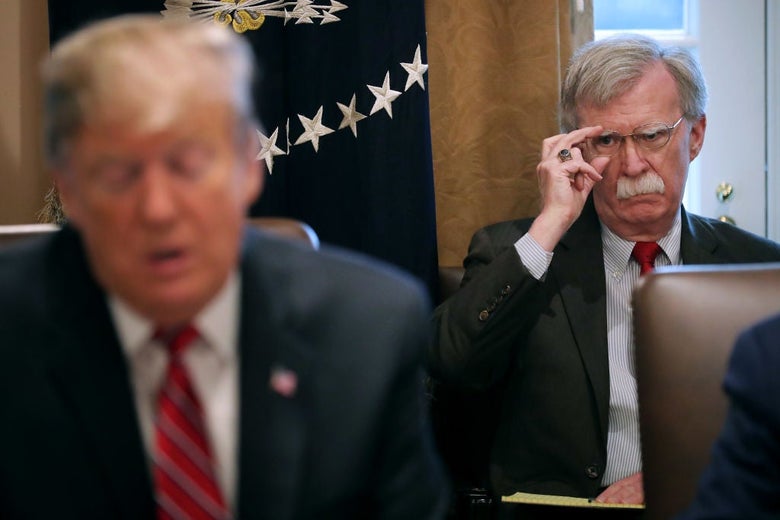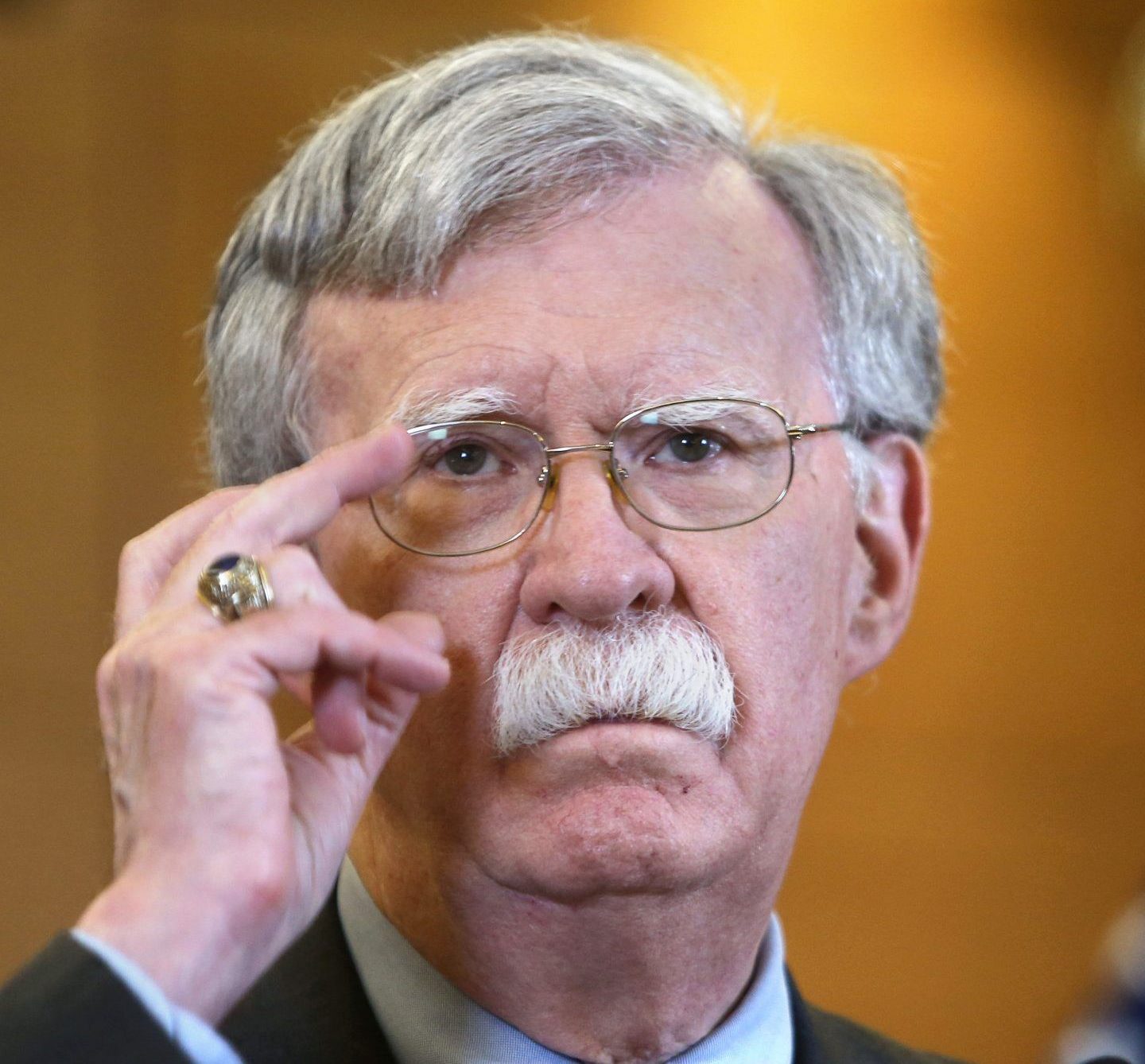
The manner of Donald Trump’s dismissal of John Bolton as National Security Adviser was characteristically ungracious. Trump and Bolton have differing accounts of exactly how it happened and few who are familiar with the records of both men are apt to find Trump the more likely truth teller. (Indeed, it is hard to think of anyone on the planet who would be apt to lose a credibility contest with Donald Trump.) In any case, the manner of Bolton’s departure is significant only as yet another example of Trump’s petty vindictiveness and his appetite for chaos. (In the ungracious firing sweepstakes, it can hardly compete with that of Rex Tillerson who was seated on a toilet in Africa when he received the news from Chief of Staff John Kelly.)
As a matter of substance, Bolton’s resignation or firing was lamented by hardly anyone, even the Republicans on Capitol Hill who had loudly applauded his appointment only last year. Nevertheless, looking back, Bolton proved to be far less dangerous than I and others had feared when he was appointed. Most particularly, he was unable to persuade Trump to launch preemptive attacks on Iran and North Korea, both of which he had advocated prior to his appointment and both of which would have been not only disastrous, but arguably, as George Will maintained, war crimes. Blog No. 175 quoted Will’s baleful assessment of Bolton’s appointment at the time:
Because John Bolton is five things President Trump is not — intelligent, educated, principled, articulate and experienced — and because of Bolton’s West Wing proximity to a president responsive to the most recent thought he has heard emanating from cable television or an employee, Bolton will soon be the second-most dangerous American. On April 9, he will be the first national security adviser who, upon taking up residence down the hall from the Oval Office, will be suggesting that the United States should seriously consider embarking on war crimes.
As it turned out, Bolton and his bellicose instincts would prove to have less influence than Will and others had supposed. It is clear that Trump has insisted on acting as his own National Security Adviser, much as he serves as his own Director of Communications. In terms of Bolton’s advice, the record is mixed. On the positive side, Bolton was among those who strenuously urged, and ultimately persuaded, Trump not to proceed with the ill-considered agreement with the Taliban. The objectionable venue (Camp David) and timing (the weekend before 9/11) for finalizing the agreement were the least of its problematic aspects. In calling off the meeting and further negotiations, Trump cited a Taliban attack that had resulted in the death of an American soldier. Yet such attacks had occurred throughout our negotiations with the Taliban and had resulted in several American casualties. It seems more likely that Trump had finally grasped the fundamental fact that the Taliban are not reliable negotiating partners.
Also on the positive side, Bolton was a strong supporter of the NATO alliance and did not share Trump’s romantic views of Vladimir Putin and Kim Jong Un. With perhaps one exception, however, it is not clear how much actual impact Bolton had. Bret Stephens, writing in the New York Times, provided a conservative’s perspective on Bolton’s tenure in “Thank You, Sort of, Not Really, John Bolton.” In that essay, he credited Bolton with having averted a “sham” deal with North Korea under which the United States would have provided sanctions relief in exchange for mere promises of disarmament by North Korean. According to Stephens, “Bolton stopped [the deal] by insisting on the North’s full and complete nuclear disarmament up front, a condition Kim could not accept because his regime cannot survive without its weapons.” Bolton may indeed be applauded for providing a counterweight to Trump’s bizarrely chummy relationship with North Korea’s murderous dictator. On the other hand, insistence on complete disarmament ”up front” is probably unrealistic and, if adhered to, will inevitably lead to a resumption of hostile rhetoric for both sides, and possibly worse.
Stephens omitted any mention to Bolton’s reference on Fox News last year to the “Libya model” in discussing the negotiations with North Korea. Bolton was presumably referring only to Libya’s complete disgorgement of weapons, and not to Gadaffi’s subsequent dispatch, but the two events are closely linked in many minds, and certainly those of the North Koreans. Hence, Bolton’s reference was undiplomatic, to say the least, and he lost whatever usefulness he had as a negotiator with North Korea. (Still, it was hardly necessary or appropriate for Trump to say, in the wake of Bolton’s departure, that “I don’t blame Kim Jong Un.”)
Stephens also cited with approval Bolton’s “fervent opposition to the Iran nuclear deal.” My own view, similar to that expressed by Jim Mattis, has been that while the deal was flawed, staying in it was in our national security interest. As our withdrawal has produced no positive results, and has increased the risk of a military confrontation, it is at least mildly encouraging that Trump has now shown signs to be willing, even eager, to re-engage with Iran. Indeed, Trump’s softening may have been the particular difference that resulted in Bolton’s departure. no matter whose version of the details ( resignation or firing, one accepts. NBC reported on Saturday that:
Former national security adviser John Bolton’s abrupt departure on Tuesday came after President Donald Trump suggested he might lift some U.S. sanctions on Iran as an incentive for Tehran to come to the negotiating table, according to a person close to Bolton.
This person said Trump raised the idea of lifting sanctions during a discussion with Bolton in the Oval Office on Monday afternoon. Bolton made clear to the president that he strongly disagreed with the idea, this person said.
It is appropriate to view renewed negotiations with Iran quite skeptically, particularly if Trump insists on personally playing a major role. Despite his frequently expressed self-regard as a deal maker, Trump’s record in that role as president is dismal: his high-profile meetings have produced no significant results with either China or North Korea.
The principal negotiating success the Trump administration can point to is the revision of NAFTA into the USMCA trade agreement, The USMCA, however, is yet to be approved by Congress, and Trump had little to do with the actual negotiations. Nevertheless, the NAFTA/USMCA negotiation could conceivably point the way with Iran. Trump had reviled NAFTA in terms every bit as harsh as those he applied to the Iran agreement (“a total disaster”). When the USMCA emerged, it made useful improvements but did not represent a radical change. Nevertheless, the incremental nature of the changes did not prevent Trump from extolling the USMCA as “a great deal.” If negotiations are left in experienced hands, it is possible that a somewhat improved Iran agreement might be reached, allowing Trump to claim a desperately needed win. And a Trump Tower Tehran? Who knows? Those Persians can be wily traders.
Despite the positives Stephens saw, he ultimately gave Bolton a failing grade, arguing that he had done a disservice to the president, the country and himself. In Stephens’s eyes, Bolton did a disservice to the president by agreeing to work for a president who opposed Bolton’s core convictions. And he did a disservice to the country, because prevention of various foreign policy fiascoes had only short term benefits and, in effect, disguised the truth about the Trump presidency. Finally, Bolton did a disservice to himself by agreeing to work for someone of Trump’s character and temperament:
Bolton could have been under no illusions about the nature of the man he chose to serve. He did so anyway. Now he must be wondering: For what?
Stephens’s assessment may be too harsh and his implied criteria too exacting. Applied literally, his standards would seem to suggest that the position of National Security Adviser should be filled by an incompetent, unprincipled sycophant. That may well be how it turns out, but surelysuch a result cannot be in the national interest.

Ordinarily I would welcome Bolton’s departure were it not for Trump’s penchant on falling back on sub-mediocre replacements. I think you summarized the qualifications for the next applicant perfectly, Doug: incompetent, unprincipled sycophant.
John Bolton was the wrong choice for National Security Advisor. His extreme hawkish views posed a serious threat to national security, and increased the risks of nuclear war between the world’s most deadly powers — Russia, the Republic of China and the United States.
We will have to see what Bolton’s replacement looks like. Clearly he will not have a mustache.
Turning to Trump. It is impossible to fully understand why the man acts as he does or what he believes, if indeed he believes in anything but himself. Likely, a many voters accept Trump’s lies and obnoxious behavior because they believe he will lead them to a better future. Hitler played the same devil’s game with the German people in the 20s and 30s and he was probably no more unbalanced than Trump.
Many thanks and kudos for keeping us aware of Trum’p’s lies and malfeasance in office. Our country deserves deserve so much better.
Comments are closed.